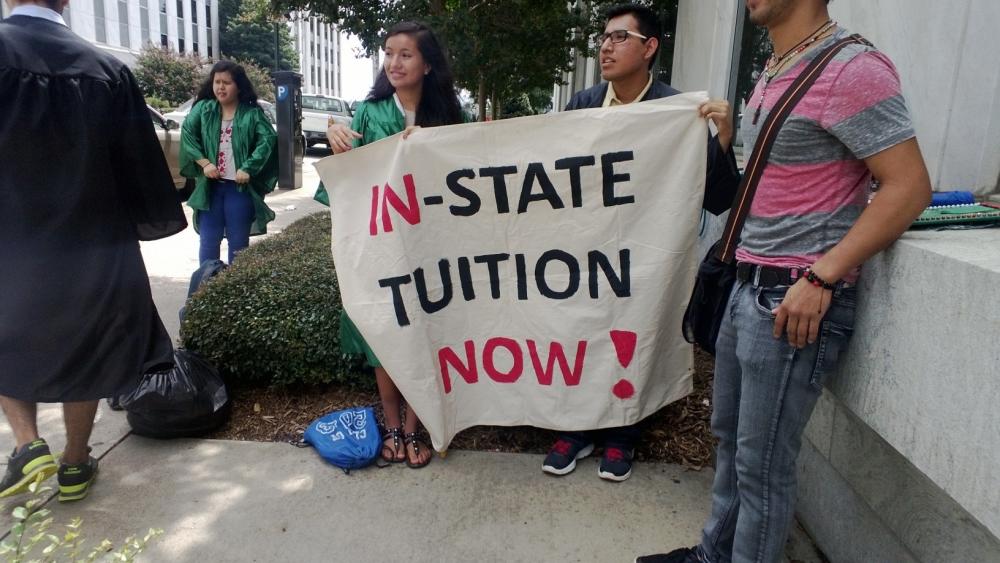
Section Branding
Header Content
Young Immigrants In Limbo
Primary Content

Money keeps many people from getting an education. But it’s especially so for a group of Georgia students whose parents brought them to the U.S. illegally. The state bars them from the top five public colleges and requires them to pay out-of-state tuition at the others. Many put their education dreams on hold or take years to complete a degree. Here are the stories of two undocumented students who should be finishing college this year. Instead, one is just starting while the other is a sophomore at a community college.
Life has changed a lot for Martin Lopez-Galicia in the past year.
For starters, the 22-year-old undocumented Atlanta resident bought a car and began driving.
Tooling around Atlanta this month, he explains why he took the risk of driving without a license.
“I had enough. I was like, ‘Man I want to drive’,” he said, driving through his neighborhood in east Atlanta. “I’m tired of asking people for rides. I’m tired of not being able to drive. I’m just going to do it.”
He watched YouTube videos to learn how to steer. Since then, he’s received a temporary stay of deportation through a federal program called Deferred Action for Childhood Arrivals. Known as DACA, it allows him for the first time to work legally, and obtain a license.
But arguably the biggest change is happening this month. Four years after graduating from high school, Martin is starting college. He’s attending Syracuse University in New York State on a full scholarship.
Shopping earlier this month for jeans, he says now the pressure is on. Few undocumented students land scholarships. And he says, it doesn’t feel real.
“This can easily be taken away. So that’s always in the back of my mind,” he said, as he paid at the counter and checked out. “I have it covered for this semester and next semester. But then what? What if this scholarship doesn’t get renewed? Then what? I can be in the same position I was in a couple of years ago, a couple of months ago.”
Maria Zavala hasn’t been as lucky. A Powdersville resident, Maria will turn 22 in October but she’s still at a two-year community college.
“I’m taking longer to get my education,” she said. “I have friends and they’re going to graduate this year. They’re seniors this year and I’m still a sophomore in college.”
Maria was at a rally this month at the Board of Regents in Atlanta. It followed a lawsuit filed by Martin and other students over the university policy. They say the federal stay of deportation gives them legal standing to pay in-state tuition.
For Maria, money is keeping her from living her dreams. She’s studying biology and wants to be a nurse.
But she’s had to combine work and school to help pay tuition. Because she’s undocumented, a full load of classes at Georgia Perimeter College costs $4,000 – three times as much as other students pay.
“I mean, my parents can’t afford to pay it all the time,” she said. “It’s very stressful and we sometimes have to borrow money from other family members and we’re just trying to make our way through it.”
When she transfers to a four-year college, her tuition will more than double. Like Martin, she’s received a temporary stay, and she says her parents pay taxes.
“It’s unfair for me to have to pay out of state tuition when I’ve been living here my whole life,” she said. “I went to high school here. I graduated. And now I want to further my education.”
University System of Georgia Chancellor Hank Huckaby says the policy is a legislative matter. He won’t comment further because of the lawsuit.
Former state Senator and current Regent George Hooks, however, defends the policy.
“The argument we get from constituents across the state is, ‘Both of us parents graduated from UGA. All the grandparents graduated from UGA. We give a lot of money and we’re very involved but we can’t get our children in’,” he said before a meeting.
Advocates for undocumented students say they don’t want special treatment.
Tony Del Campo is a former superior court judge and chair of the Georgia Association of Latino Elected Officials.
“We have a whole class of individuals just waiting for their turn at the American dream,” he said.
In Washington, Congress is still debating a federal immigration overhaul. But with Georgia’s policy firmly in place, both Martin and Maria say it doesn’t matter.
They still won’t be able to pay in-state tuition at the college of their choice in the state they grew up in – even if it passes.
Tags: Georgia Tech, UGA, University System of Georgia, Board of Regents, higher education, illegal immigration, undocumented, Georgia Students, top five public colleges, out-of-state tuition
